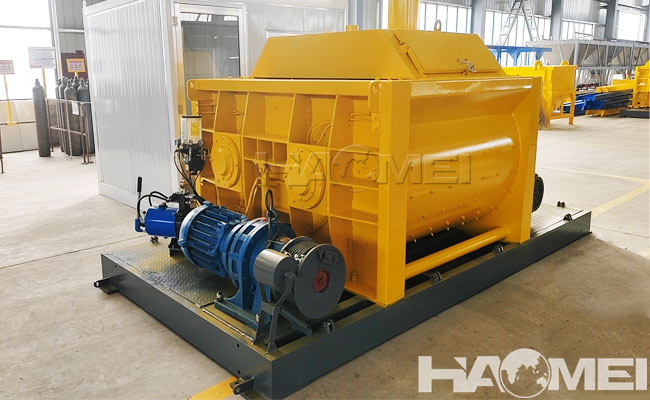How Much Does A Concrete Mixer Cost?
The concrete mixer is a common piece of construction equipment, widely used in various concrete projects. The JS series concrete mixers are generally available in different models, including the JS500, JS750, JS1000, JS1500, JS2000 and JS3000. How much does a concrete mixer cost vary depending on factors such as model, configuration, brand, purchase location and market conditions.

The JS series concrete mixer is a twin-shaft forced mixer. It offers the dual advantages of standalone operation and can be combined with a PLD series concrete batching machine to form a simple concrete mixing plant. It can also be supplied as a supporting mainframe for concrete batching plants. This series of concrete mixers is suitable for large, medium, and small precast component plants, as well as industrial and civil construction projects such as highways, bridges, water conservancy projects, and docks. It can mix dry concrete, plastic concrete, flowable concrete, lightweight aggregate concrete, and various mortars, and is a highly efficient model.
The price of the JS series concrete mixer varies depending on factors such as model, configuration, manufacturer, and market demand. The following are approximate price ranges for some common models (in US dollars):
JS500 concrete mixer cost: Approximately $3,000 - $6,000
JS750 concrete mixer cost: Approximately $5,000 - $10,000
JS1000 concrete mixer cost: Approximately $10,000 - $15,000
JS1500 concrete mixer cost: Approximately $15,000 - $25,000
JS2000 concrete mixer cost: Approximately $20,000 - $30,000
JS3000 concrete mixer cost: Approximately $30,000 - $50,000
Please note that the above prices are for reference only and may vary depending on brand, region, configuration, and market demand.
Structure of JS concrete mixer:
Mixer drum: Typically made of high-quality steel, offering high strength and wear resistance.
Improving impeller: Designed with twin impellers, it achieves uniform mixing in a short time.
Drive system: Equipped with a high-efficiency motor and reducer to ensure the mixer operates normally under high loads.
Working Principle of JS concrete mixer:
When the motor is turned on, the agitator rotates at high speed within the mixing drum, continuously stirring and mixing the concrete ingredients (such as cement, sand, and gravel), ultimately forming a uniform concrete.
Technical Parameters of JS concrete mixer:
Technical parameters may vary for each model. The following are some common specifications:
Mixing Capacity: Ranges from 500 liters to 1500 liters. Mixing power: Typically between 18.5 kW and 75 kW.
Mixing speed: Adjustable, typically between 30 and 60 rpm.
Features of JS concrete mixer:
- Efficient Mixing:
The dual-shaft design enables fast and uniform mixing of concrete, making it suitable for large-scale production.
- Durability:
Constructed of high-strength materials, it can withstand heavy loads and has a long service life.
- Easy Operation:
Equipped with an advanced electronic control system, users can easily operate and adjust mixing parameters.
- Versatility:
The mixing time and speed can be adjusted to meet different mixing needs.
Applications of of JS concrete mixer:
Construction: Used in the construction of various concrete structures, including residential and commercial buildings.
Road Construction: Used in infrastructure construction, such as highways, bridges, and tunnels.
Precast Component Production: Suitable for the production of precast concrete components, such as wall panels, beams, and columns.
When choosing a JS series concrete mixer, in addition to the concrete mixer cost, it's recommended to select an appropriate model based on actual needs (such as concrete production volume and project scale). Also consider factors such as after-sales service, spare parts availability, and the manufacturer's reputation.

